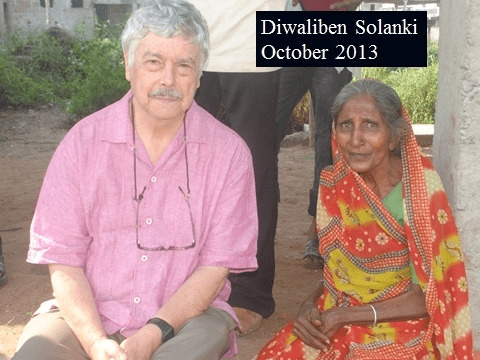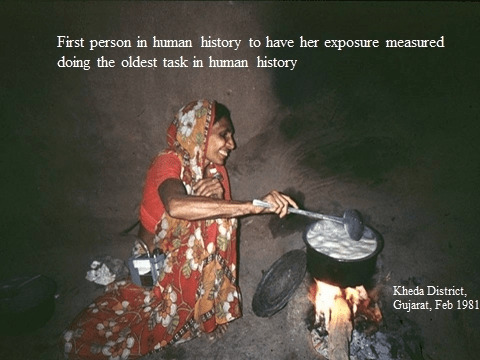From Delhi:
In 1981, Indian colleagues and I conducted the first measurements ever done of the air pollution exposures from cooking over open biomass cookstoves. A couple of weeks ago, with my family, I went back to the four villages in Gujarat to see if we could find any of the women we worked with long ago. We went from village to village with an album of the photos from the old study to see if anyone could identify one of the participants. In particular, I wanted to find the first woman we worked with, whose photo I always show in my lectures — see the top photo.
Believe it or not, we found her! Diwaliben Solanki is now 70 years old and a bit frail physically but clearly remembers the study and that she was the first in the village to wear the equipment. I told her that her photo had been seen by millions of people around the world and that hundreds of more studies like the first one had been done in India and elsewhere since 1981. It was a bit emotional for both of us, as you can imagine.
Below is a photo of the two of us. Note her good taste in saris is still evident.
Although there was some noticeable change in the villages – reliable electricity, cell phones, satellite TV dishes, piped water, a few refrigerators and LPG stoves, a pressure cooker in every house, and a larger fraction of “pucca” housing and schools — made of permanent materials – one thing has not changed: nearly but not all households still using open biomass chullahs for most of their cooking. Memories varied, but 3-5 “improved” stove programs had swept through the villages since the 1970s (we evaluated one in our first study) but no one could think of any improved stoves that even were still in existence, let alone being used.
Today, India has about 700 million people relying primarily on open chullahs for cooking. In 1981 when we did the first study, there were about 700 million people in the entire country! Clearly, very little progress has been made in terms of the absolute health burden from household air pollution here, which has recently been estimated at about one million premature death annually, the largest single health risk factor found for Indian women and girls.
Although there have been hundreds of measurement and health studies in India since, the exposures we measured in that first study are well within the range we find today responsible for these effects.
We gave Diwaliben and the one other woman we found from the original study (or rather their daughters in law who do most of the cooking now) the cleanest stove in the world as thanks for their participation long ago. Indeed, one might even say it was actually the first time since 1981 that I could have returned to give them something that is truly clean and reliably usable locally.

Even with significant development occurring in these villages in the last decades, household fuel patterns have not improved significantly. 700 million people still seem to be caught in the “chullah” trap in India, i.e., using open biomass stoves with consequent impacts on health, climate, and local environments. Entirely new approaches are needed to break out of this trap utilizing advanced technologies, innovative dissemination modes, and cross-sectorial financing strategies. A million premature deaths a year make it imperative.
Kirk R. Smith is a Professor of Global Environmental Health at UC Berkeley’s School of Public Health
MAHB-UTS Blogs are a joint venture between the University of Technology Sydney and the Millennium Alliance for Humanity and the Biosphere. Questions should be directed to joan@mahbonline.org.
MAHB Blog: https://mahb.stanford.edu/blog/then-and-now/
The views and opinions expressed through the MAHB Website are those of the contributing authors and do not necessarily reflect an official position of the MAHB. The MAHB aims to share a range of perspectives and welcomes the discussions that they prompt.
